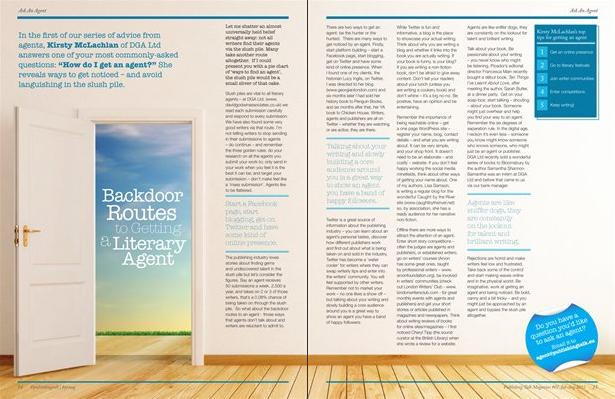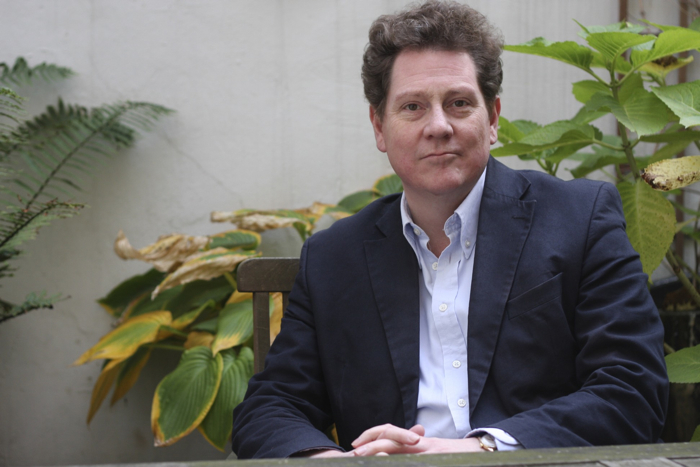Backdoor Routes to Getting a Literary Agent

Kirsty McLachlan of DGA Ltd answers one of your most commonly-asked questions: “How do I get an agent?” She reveals ways to get noticed – and avoid languishing in the slush pile.
Let me shatter an almost universally held belief straight away: not all writers find their agents via the slush pile. Many take another route altogether. If I could present you with a pie chart of ‘ways to find an agent’, the slush pile would be a small sliver of that cake.
Slush piles are vital to all literary agents – at DGA Ltd we read each submission carefully and respond to every submission. We have also found some very good writers via that route. I’m not telling writers to stop sending in their submissions to agents – do continue – and remember the three golden rules: do your research on all the agents you submit your work to; only send in your work when you feel it is the very best it can be; and target your submission – don’t make it feel like a ‘mass submission’. Agents like to be flattered.
The publishing industry loves stories about finding gems and undiscovered talent in the slush pile but let’s consider the figures – say an agent receives 50 submissions a week, 2500 a year, and takes on 2 or 3 of those writers, that’s a 0.08% chance of being taken on through the slush pile. So what about the backdoor routes to an agent – those ways that agents don’t talk about and writers are reluctant to admit to.
There are two ways to get an agent: be the hunter or the hunted. There are many ways to get noticed by an agent. Firstly, start platform building – start a Facebook page, start blogging, get on Twitter and have some kind of online presence. When I found one of my clients, the historian Lucy Inglis, on Twitter, I was directed to her blog (www.georgianlondon.com) and six months later I had sold her history book to Penguin Books, and six months after that, her YA book to Chicken House. Writers, agents and publishers are all on Twitter – whether they are watching or are active, they are there.
Twitter is a great source of information about the publishing industry – you can learn about an agent’s personal tastes, discover how different publishers work and find out about what is being taken on and sold in the industry. Twitter has become a ‘water cooler’ for writers where they can swap writerly tips and enter into the writers’ community. You will feel supported by other writers. Remember not to market your work – no one likes a show off – but talking about your writing and slowly building a core audience around you is a great way to show an agent you have a band of happy followers.
While Twitter is fun and informative, a blog is the place to showcase your actual writing. Think about why you are writing a blog and whether it links into the book you are actually writing. If your book is funny, is your blog? If you are writing a non-fiction book, don’t be afraid to give away content. Don’t tell your readers about your lunch (unless you are writing a cookery book) and don’t whine – it’s a big no-no. Be positive, have an opinion and be entertaining.
Remember the importance of being reachable online – get a one page WordPress site – register your name, biog, contact details – and what you are writing about. It can be very simple, and your shop front. It doesn’t need to be an elaborate – and costly – website. If you don’t feel happy working the social media minefields, think about other ways of getting your name about. One of my authors, Lisa Samson, is writing a regular blog for the wonderful Caught by the River site so, by association, she has a ready audience for her narrative non-fiction.
Offline there are more ways to attract the attention of an agent. Enter short story competitions – often the judges are agents and publishers, or established writers; go on writers’ courses (Arvon has some great ones, taught by professional writers), be involved in writers’ communities (check out London Writers’ Club for great monthly events with agents and publishers) and get your short stories or articles published in magazines and newspapers. Think about writing reviews of books for online sites/magazines – I first noticed Cheryl Tipp (the sound curator at the British Library) when she wrote a review for a website. Agents are like sniffer dogs, they are constantly on the lookout for talent and brilliant writing.
Talk about your book. Be passionate about your writing – you never know who might be listening. Picador’s editorial director, Francesca Main recently bought a debut book, Ten Things I’ve Learnt About Love, after meeting the author, Sarah Butler, at a dinner party. Get on your soap-box: start talking – shouting – about your book. Someone might just overhear and help you find your way to an agent. Remember the six degrees of separation rule. In the digital age, I reckon it’s even less – someone you know might know someone who knows someone, who might just be an agent or publisher. DGA Ltd recently sold a wonderful series of books to Bloomsbury by the author Samantha Shannon. Samantha was an intern at DGA Ltd and before that came to us via our bank manager.
Rejections are horrid and make writers feel low and frustrated. Take back some of the control and start making waves online and in the physical world. Be imaginative, work at getting an agent and being noticed. Be bold, canny and a bit tricky – and you might just be approached by an agent and bypass the slush pile altogether.
Kirsty McLachlan’s top tips for getting a literary agent
- Get an online presence
- Go to literary festivals
- Join writer communities
- Enter competitions
- Keep writing!
This article first appeared in issue 1 of Publishing Talk Magazine.



I couldn’t get an agent for love nor money when I first started looking. It was an absolute nightmare, I’d tried relationship building on Twitter, liking pages, badgering with emails and letters, the lot.
My email rejection folder was bulging and my heart was aching.
What cracked it for me was forcing myself to network with writers, the old “friend of a friend” route got me there in the end.
Bizarrely, as soon as I had an agent, other agents started interacting with me due to them no longer seeing me as just another “desperate” writer.
If anyone was daft enough to want my advice I’d say this, persevere, network with other authors and don’t bother trying to befriend agents on social media. Most importantly (as I’ve since found out) get as much of your work on the net in as many different places as you can.
Good luck, keep going, you’ll get there.
Tony
I agree with you about social media being important but the king has to be Twitter. Regarding agents rejections I find my rejection letters are becoming more polite. An improvement or a step in the right direction I hope.
Okay, so there’s a 0.08% chance of being spotted in the slush pile by an agent (not a publisher mind you). This power seems to breed a certain arrogance & often (no, usually) rejections are at best insensitive, not acknowledging that a writer has spent often years on a project, at worst downright rude. Civility and mutual regard were once cornerstones of publishing and its associated trades; apparently no longer. Courtesy & consideration should be restored, or much talent will be lost, having encountered one bruising rejection too many.
I totally agree with what was said in the previous paragraph. If not for us writers, where would the publishing industry be right now. They need to open their doors wider and let a few of us “Indies” in!
Well, I for one, am not comfortable on social media. I am a writer first. I hope to make my mark based on my work and not on how well I market myself. Not that I wouldn’t assist in touting my picture books, but I am a rather quiet individual who would prefer to spend their time revising. If that means I don’t get noticed, then I must refer to a time before social media existed. How did writers get noticed then?
there have been many things said about unpublished/newbie writers/authors,but tenacity is not one of them.there must be an re-examination of many publisher’s policy on manuscript submissions.I recognize the need to accept works through literary agents or established authors,there too as well,must a stand be taken that the success of many businesses(publishers),would not occur had it not been for these “newbie”writers/authors,that in turn keep many of these publishers afloat,by producting quality material(books,magazines,newspapers,periodicals,etc.),that makes them money and keep their bottom line “profitable.”Not that I don’t recognize that poor work is there also(regardless of shape,form,stature,etc.),but the reliability on authors(estabilshed or not,should give publishers reason,to consider that even with the advent of new technology(i-pads,i-pods,e-books,nooks,kindle,etc.),would provide a way not only to profit authors/writers,but them as well.Bottom line:if you want respect publishers(businesses),you too must give authors the same as well.For if more readers buy your product(books,newspapers,magazines,etc.),then all benefits from such as well.